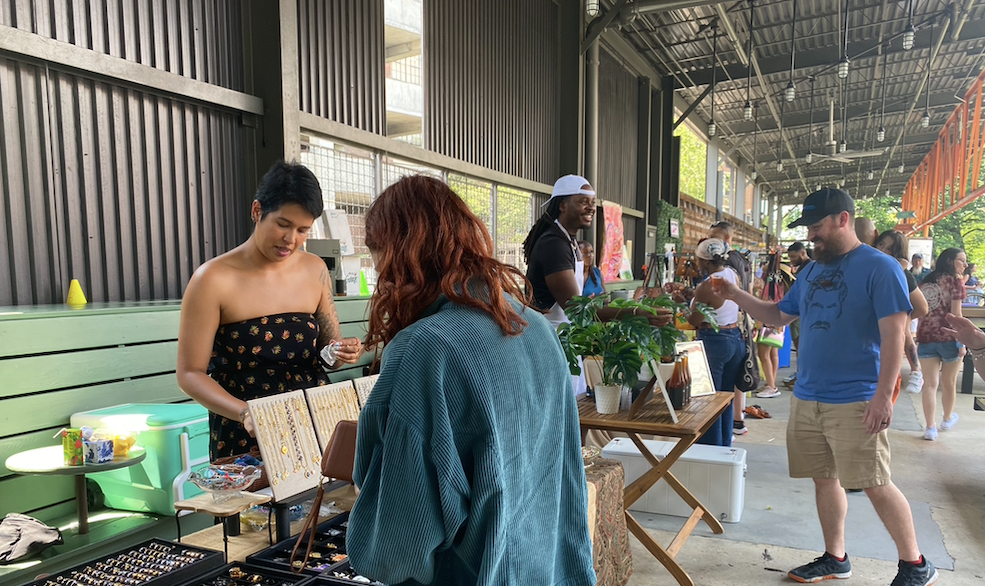Despite looming inflation and the lingering threat of an economic recession, Atlanta’s small business community remains on the rise as small business owners work to navigate entrepreneurship in the aftermath of increased competition and limited resources.
As Atlanta continues to morph into a hotspot for large corporations aiming to establish a physical presence in the Southeast, the city also becomes increasingly favorable for small-scale businesses looking to find a place in the local economy.
According to a survey conducted by Truist Financial Corporation, which recorded small business owners’ actions and stances on their pursuits and the state of the U.S. economy, owners are experiencing increased concerns in operating their businesses, as prices continue to climb and the national labor shortage presses on.
The survey compared localized results to national findings, discovering that a higher percentage of Atlanta-based entrepreneurs felt their business conditions improved over the past year, with 64% of the city’s surveyed business owners citing a positive change within their workplace, while just 52% of small business owners on a national scale reported similar remarks.
However, the same percentage of Atlanta-based entrepreneurs also reported experiencing feelings of stress induced by the workload and pressures of managing business operations, compared to just over half of small business owners nationwide.

On a national scale, the survey states that small business owners are most concerned about three economically-focused factors: inflation, rising costs and general economic uncertainty.
Financial setbacks from the pandemic years and beyond have forced entrepreneurs to make changes to their business models in order to attract and retain employees. According to Truist’s survey, an increase in wages, benefits and the added option to work remotely are three of the most popular incentives now offered by employers to encourage their staff to continue working for them. Small business owners will likely have to make permanent adjustments to their individualized workplace cultures in order to maintain worker satisfaction.
“What we’ve seen from both the survey and through our conversations with small business owners is that the remote work environment is here to stay,” said Scott Stearsman, Truist’s head of small business. “So, we’ve seen a big focus on small business owners creating flexibility in work schedules and [implementing] remote work capabilities.”
Though, finding and maintaining reliable labor continue to serve as struggles for business owners locally and nationally. Katie Saez, Georgia regional president at Truist, said that while the city’s economic growth since emerging from the pandemic’s shutdown is impressive, it hasn’t been consistent, with some small businesses flourishing to the point of operating at full capacity, while others still struggle to find employees.
“I think the business-client community has done a really great job at adjusting to the evolving needs of their consumer base and their client base, and are in a pretty good position out of COVID,” Saez said. “And now we’re staring at this new realm of uncertainty. Are we in a recession? Are we going into a recession? What’s that going to mean for the small business community, and how can we be ready to adjust to it? I’ll tell you though, the Atlanta community has shown great resilience.”
In spite of this fluctuation in growth, Saez said Atlanta’s combination of available economic resources and skilled talent still makes the city an ideal setting for small business owners to find their footing and establish profitable ventures.

“There’s so much opportunity for small businesses [in Atlanta],” Saez said. “We continue to see great economic development across the state, and Atlanta is really a hub for a lot of that.”
However, Atlanta’s key ingredient for smaller-scale economic progression, may also serve as a direct contributor to small business owners’ reported enhanced stress and unstable work-life balance. Saez said Atlanta’s economy, which encourages increased entrepreneurship among residents, in turn fosters competition between already existing small businesses, forcing all business owners to work harder to turn a profit.
“Winning new clients due to growth and positive economic conditions is attainable, but losing clients to the great competition is equally challenging,” Saez said. “It’s a very competitive market because there’s a lot of development and new businesses, and that, I think, adds to the stress of owning and managing a business here.”
The mass creation of jobs that occurs when corporations establish headquarters and new offices in the metro Atlanta area also generates competition among small-scale business owners in terms of hiring and retaining workers and generating revenue. Though, Saez said the expansion of large companies across greater Atlanta could benefit small businesses, as well, highlighting the need for privately-owned retailers, restaurants and other ventures to exist alongside them.
“Opportunity creates opportunity,” Saez said. “And I think anytime a company, large or small, chooses to call Georgia home for either their headquarters or an expansion of their business, it’s going to create opportunity for other organizations or businesses, as well.”

